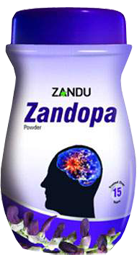Herbal Remedies for Parkinsonism, Parkinson's Disease
Parkinson's disease is a degenerative disease of the brain cells that is also known as Paralysis agitans or shaking palsy. It is a serious disease of the central nervous system and impairs motor skills, speech and other functions. This disease is named after the English physician James Parkinson. Ayurveda - the ancient healthcare system of India described it as "Vata imabalance" and the herbal remedies recommended for vata imbalances have been found to be very useful for parkinson's as well. The combo pack has all anti-vata herbs and useful in other mind condions like forgetfulness, lack of concentration, mental fatigue as well as parkinsonism. These herbs do not have any side effects and give good results if used together.
Dosage
- Brahmi Capsules - 1 capsule twice daily with warm water after meals.
- Vrihat Vatchintamani Ras - 1 tablet twice daily with warm water after meals.
- Musli Strength - 1 capsule twice daily with warm water after meals.
- Zandopa Powder - 1 teaspoonful, twice daily after meals.
- Ashwagandha Capsules - 1 capsule twice daily with warm water after meals.
- Brahmi Chyawanprash - 1 teaspoonful, twice daily after meals, preferably with milk.
Zandopa Granules - A Unique Product for Parkinsonism

- Zandopa Readily bioavailable natural source of L-Dopa (levodopa).
- Better Tolerability.
- Suitable for longterm use.
- Economical
In parkinson's disease Zandopa a natural source of dopamine.
Suggestion for Parkinson's Disease Patient
Appropriate treatment helps to keep the patient working and enjoying active life for many years. With proper medication, patience, and perseverance to stay active, your sign and symptoms can be controlled for many years.
- Always allow ample time for each day to day activity so that you need not hurry.
- Do not get discouraged if exercises or activities seem difficult on some days.
- Do every thing you can yourself, no matter how slowly.
- Concentrate on one activity at a time, and avoid trying to do two things at one time.
- Continue a simple program of exercises on a regular basis.
Composition
Each 7.5g contains : Standardised processed seed-powder of Mucuna pruriens . . . . 6.525gm in a flavoured base.
Dosage
1-2 tablespoonfuls twice daily with plain water
Directions
In Half a glass of water (approx - 100ml) suspend prescribed dose powder, stir and drink immediately.
Caution
- Store in a cool dry place.
- Protect from light.
- Keep the continer tightly closed.
How to Deal with Parkinson’s Disease?
Parkinson’s disease belongs to a group of conditions known as extra pyramidal symptoms and is characterized by stiffness of the muscles and continuous tremors. This is accompanied by reduced physical movement or bradykinesia and in severe cases complete loss of movement or akinesia. An individual suffering from Parkinson’s disease exhibits a combination of involuntary tremor of the limbs and muscular stiffness.
The tremors become more prominent when the patient is in a resting position and tend to disappear when he attempts to move or is asleep. The tremors are most pronounced when the patient becomes excited or is fatigued. Older patients often exhibit involuntary rapid jerking movements of the limbs and may also exhibit purposeless mastication and lip smacking movements. This is followed by impaired speech, muscle cramps, inability to move and loss of judgment.
Dealing with Parkinson’s Disease
Vitamin E
The use of vitamin E in therapeutic doses of 800 – 3000 IU per day has proved highly beneficial for treating Parkinson’s disease. It has shown to slow down the pace of this disease and enhances the recovery process. Intake of vitamin E slows free radical damage that destroys the cells of the basal ganglia. Dietary sources of vitamin E include green leafy vegetables, whole grain products, wheat germ, eggs, milk, raw or sprouted seeds or nuts.
Essential Fatty Acids
These are required for maintaining the integrity of cell membranes that become disrupted due to Parkinson’s disease. Dietary sources of essential fatty acids include nuts, seeds and oily fish. Evening primrose oil has shown to reduce tremors caused by Parkinson’s disease and helps prevent the progression of the disease by boosting the transmission of nerve impulses. It is recommended for you to take evening primrose oil in therapeutic doses of 1500mg per day to deal with Parkinson’s disease effectively.
Lady’s Slipper
This herb is also highly beneficial for dealing with Parkinson’s disease and helps control tremors and depression associated with it. It is recommended to take lady’s slipper in the form of tincture or drops. For best results add 10 drops of Lady’s slipper extract to a glass of water and take it thrice a day.



